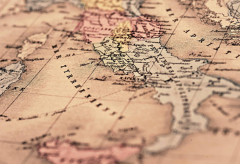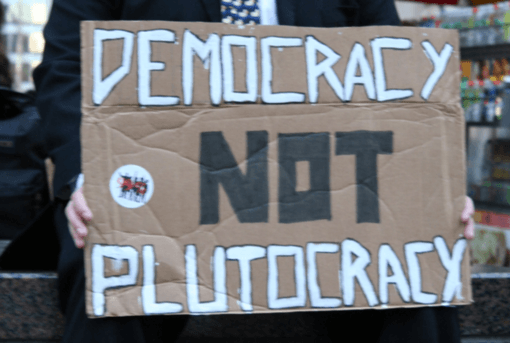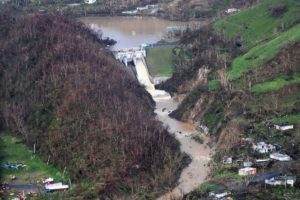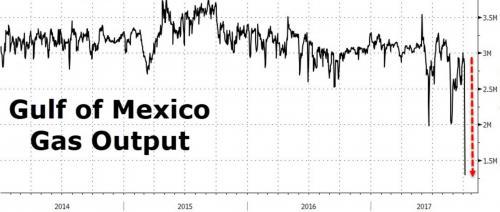Steve Bull's Blog, page 1293
October 7, 2017
“A Civil War Is Coming” – EU Commissioner Urges Madrid & Barcelona To Talk
The EU’s budget commissioner has warned of the risk of “civil war” in Catalonia, as fears grew over a looming independence declaration and major banks prepared to relocate their headquarters.
With just 48 hours until Catalonia’s Parliament meets, defying Madrid, to debate secession, Gunther Oettinger, the Germany EU commissioner urged dialogue…
“The position is very, very alarming. Civil war is conceivable there, in the middle of Europe,” he began.
”One can only hope that a conversation will be made between Madrid and Barcelona soon,” he continued, adding that the EU could only mediate talks “if asked.”
The German commissioner’s startling remarks prompted disquiet among EU diplomats. One told VOA he thought the comments “nonsense.”
What would Spain lose if Catalonia becomes independent?
Independence for Catalonia has been a long time coming…

As VOA reports, Oettinger and the EU Commission, the European bloc’s governing body, which fears Catalan independence might stir up separatism elsewhere in Europe, have also urged the authorities in Madrid and Barcelona to start negotiations and to avoid further provocations.
…click on the above link to read the rest of the article…
Why Small States Are Better

Andreas Marquart and Philipp Bagus (see their mises.org author pageshere and here) were recently interviewed about their new book by the Austrian Economics Center. Unfortunately for English-language readers, the book is only available in German. Nevertheless, the interview offers some valuable insights.
Mr. Marquart, Mr. Bagus, you have released your new book „Wir schaffen das – alleine!” (“We can do it – alone!”) this spring. The subtitle says: “Why small states are just better.” To begin: Why are small states generally better than larger ones?
Andreas Marquart (AM): In small states the government is closer to its citizens and by that better observable and controllable by the populace. Small states are more flexible and are better at reacting and adapting to challenges. Furthermore, there is a tendency that small states are more peaceful, because they can’t produce all goods and services by themselves and are thereby dependent on undisturbed trade.
How far can the principle of small states go? You are for example open to the idea of Bavaria seceding from Germany, or Upper Bavaria then from the rest of Bavaria. Ludwig von Mises stopped at the communal level, thinking that the secession of individuals would be unrealistic. You as well? Is there a point when your rule – the more decentralized the better – is not true anymore?
Philipp Bagus (PB): In principle not. We don’t want to arrogate, however, to know the optimal size and to say that this state is too small and that one too big. The optimal size would be determined in competition through the right of secession. If an apartment tower or street secedes from its municipality and then concludes that there are problems which were previously done better, then the secession could be revoked and the two entities reunited.
…click on the above link to read the rest of the article…
State Of Emergency Declared Across Southeastern US As Hurricane Nate Looms
Update (1 pm ET): With Nate expected to strengthen into a category 2 storm by the time it makes landfall in southeastern Louisiana late Saturday, the NHC has expanded its storm warnings to include the part of the Florida panhandle east of the Okaloosa/Walton County Line to Indian Pass Florida, which is now under a tropical storm warning. Meanwhile, mandatory evacuations are set to begin in Port Fourchon, Louisiana at 12pm local time Saturday for remaining staff at the port, according to storm update by the Greater Lafourche Port Commission. This follows mandatory evacuation ordered by Lafourche Parish, La., President Jimmy Cantrelle for areas below floodgates in Golden Meadow, La. In addition, the US Coast Guard has suspended marine traffic activity as of 8 am local time for sector Mobile, which includes the ports of Gulfport and Pascagoula in Mississippi, Mobile, Ala., and Pensacola, Fla., in preparation for Hurricane Nate, according to an agency bulletin.
Staff at offshore oil rigs in the Gulf were ordered to evacuate, leaving nearly three-quarters of US Gulf of Mexico oil production was offline ahead of the storm. American Midstream Partners LP’s Destin gas pipeline and Enbridge Inc.’s Nautilus and Manta Ray lines are evacuating staff from Gulf platforms.
Thanks to Harvey, and now Nate, natural gas production in the Gulf of Mexico has plunged to the lowest level in three years. Gulf gas output may drop as much as 1.4 billion cubic feet a day, while 1.1 million barrels a day of offshore oil production and 3 million barrels of refining capacity are at risk, according to Shunondo Basu, an analyst at Bloomberg New Energy Finance.
…click on the above link to read the rest of the article…
Spain’s Crisis is Europe’s Opportunity
 Jorge Guerrero/Getty Images
Jorge Guerrero/Getty ImagesSpain’s Crisis is Europe’s Opportunity
The Catalonia crisis is a strong hint from history that Europe needs to develop a new type of sovereignty, one that strengthens cities and regions, dissolves national particularism, and upholds democratic norms. Imagining a pan-European democracy is the prerequisite for imagining a Europe worth saving.
ATHENS – To revive the ailing European project, the ugly conflict between Catalonia’s regional government and the Spanish state may be just what the doctor ordered. A constitutional crisis in a major European Union member state creates a golden opportunity to reconfigure the democratic governance of regional, national, and European institutions, thereby delivering a defensible, and thus sustainable, EU.
The EU’s official reaction to the police violence witnessed during Catalonia’s independence referendum amounts to dereliction of duty. To declare, as the President of the European Commission did, that this is an internal Spanish problem in which the EU has no say is hypocrisy on stilts.
Of course, hypocrisy has long been at the center of the EU’s behavior. Its officials had no compunction about meddling in a member state’s internal affairs – say, to demand the removal of elected politicians for refusing to implement cuts in the pensions of their poorest citizens or to sell off public assets at ridiculous prices (something I have personally experienced). But when the Hungarian and Polish governments explicitly renounce fundamental EU principles, non-interference suddenly became sacrosanct.
The Catalan question has deep historical roots, as does nationalism more broadly. But would it have erupted the way it recently did had Europe not mishandled the eurozone crisis since 2010, imposing quasi-permanent stagnation on Spain and the rest of the European periphery while setting the stage for xenophobia and moral panic when refugees began crossing Europe’s external borders? An example illustrates the connection.
…click on the above link to read the rest of the article…
October 6, 2017
The Catalan Chain Reaction
Catalonia’s drive for “independence” has unleashed a chain reaction of viral social media support that’s frighteningly resurrected civil war-era rhetoric, but the most dangerous consequences of this domino effect are yet to come if the separatists are ultimately successful in their quest.
The Nostalgia Narrative
The Catalan “independence” cause has taken the world by storm, thrown into the global spotlight by the heavily publicized referendum earlier this week and Madrid’s forceful response to this unconstitutional measure. Supporters all across the world have been energized by the recent events and have taken to describing them in civil war-era terms as a battle between “democracy” and “fascism”. Furthermore, they also accuse the Rajoy government of being “Francoists”, as they do the country’s post-Franco 1978 Constitution which returned Catalonia’s autonomy in an even more robust way than before and even bestowed this privilege to the rest of the country as well.
Although it can be safely presumed that Spain naturally retained some of the “Francoist” members of its permanent military, intelligence, and diplomatic bureaucracies (“deep state”) after the death of their movement’s eponymous leader, it’s an exaggeration to refer to the constitution and the present government as “Francoists” in the sense of what the term stereotypically implies. Rather, the improper use of such polarizing civil war-era terms demonstrates that the separatists are trying to capitalize on the revolutionary nostalgia that their domestic and foreign supporters have for reliving the 1936-1939 anarcho-communist experiment via a simulacrum, one which plays out differently depending on their audience.
Two Simulacra
As it relates to the Catalans themselves, this is meant to force them into the false binary choice between “standing with their ancestors against fascism” or “betraying their motherland for the Francoists”.
…click on the above link to read the rest of the article…
How Big Corporations Game Our Democracy Into Their Plutocracy

Photo by Todd Blaisdell | CC BY 2.0
A major chapter in American history – rarely taught in our schools – is how ever larger corporations have moved to game, neutralize and undermine the people’s continual efforts to protect our touted democratic society. It is a fascinating story of the relentless exercise of power conceived or seized by corporations, with the strategic guidance of corporate lawyers.
Start with their birth certificate – the state charters that bring these corporate entities into existence, with limited liability for their investors. In the early 1800s, the Massachusetts legislature chartered many of the textile manufacturing companies. These charters could be renewed on good behavior, because lawmakers then viewed charters as privileges contingent on meeting the broad interests of society.
Fast forward to now. The charter can be granted online in a matter of hours; there are no renewal periods and the job is often given over to a state commission. Over the decades, corporate lobbyists have had either the legislatures or the courts grant them more privileges, immunities and concentration of power in management, rendering shareholders – their owners – increasingly powerless. The same corporate fixers work for corporations and their subsidiaries abroad to help them avoid US laws, taxes and escape disclosures.
Remarkably, the artificial creation called the “corporation” has now achieved almost all of the rights of real people under our “We the People” Constitution that never mentions the words “corporation” or “company.”
Corporations cannot vote, at least not yet; only people can. That was seen as a major lever of democratic power over corporations. So what has happened? Commercial money to politicians started weakening the influence of voters because the politicians became increasingly dependent on the corporate interests that bankrolled their campaigns.
…click on the above link to read the rest of the article…
The Spiraling Crisis of Puerto Rico
Puerto Rico’s infrastructure, which already faced severe pressures because of the U.S. territory’s huge debt and demands from its creditor, has now been devastated by Hurricane Maria, as Dennis J Bernstein reports.
Though President Trump bragged about the relatively low death toll from Hurricane Maria — 16 at the time of his visit on Tuesday — the number soon jumped to 34 and was expected to rise much more when isolated hospitals could finally report in.
Many of the island’s 59 hospitals were cut off from power and half the island’s 3.4 million inhabitants lacked safe drinking water. The continuing crisis reflected a slow response from the federal government.

A devastated area in San Juan, Puerto Rico in the aftermath left by Hurricane Maria, Sept. 23, 2017. (Puerto Rico National Guard photo by Sgt. Jose Ahiram Diaz-Ramos)
Puerto Rican Jewish feminist writer, poet, and activist Aurora Levins Morales is a nationally known Puerto activist. In the following interview, Morales expressed her outrage at Trump’s racist response to the Puerto Rican hurricane disaster.
Morales is the author of Medicine Stories, Remedios: Stories of Earth and Iron from the History of Puertorriqueñas, and Kindling: Writings On the Body, and co-authored two books with her mother, Rosario Morales.
She created the Vehicle for Change project to research, design, fund and build her chemically accessible mobile home, and is currently traveling around the United States writing about the confluence of ecology, health and social justice struggles for her radio blog Letters from Earth, broadcast on Flashpoints on Pacifica Radio. She writes and performs with Sins Invalid, a Bay Area disability justice performance project. I spoke to Morales on October 2.
Dennis Bernstein: Aurora Levins Morales has been watching the situation very closely. This is your homeland and you must be heartbroken.
…click on the above link to read the rest of the article…
The Political and Economic Mystiques of State Power
One of the great political mysteries has been the success of governments in ruling over societies with little opposition and resistance from the vast majority of the population, even when those governments have been brutal tyrannies and openly dictatorial in their control.
This has been true, no less, under democratic regimes, as well, under which levels of taxation have been far higher and the degrees of regulation over personal, social and economic activities often much more intrusive than under tyrants of bygone ages. This has been in spite of the fact that those governments are formally “answerable to the people” through regular elections determining who holds high political office with legitimized power over the electorate’s lives.
Conquest and Plunder as the Origin of the State
It has long been understood by historians that most modern States, such as in Europe, have their origins in conquest and plunder. Invading tribes and bands would vanquish existing rulers and their peoples, and settle down to permanently live off those whom they had not killed during the conquest.
The German sociologist, Franz Oppenheimer (1864-1943), especially emphasized this in his classic work on the origin of political power and authority, The State (1914). He argued that there are fundamentally two ways by which individuals may obtain the material means that they wish to have to maintain and improve their lives: the economic means and the political means: Said Oppenheimer:
There are two fundamentally opposed means whereby man, requiring sustenance, is impelled to obtain the necessary means for satisfying his desires. There are work or robbery, one’s own labor and the forcible appropriation of the labor of others.
…click on the above link to read the rest of the article…
Iran, Iraq, And Turkey Unite To Block Kurdish Oil Exports

Iraq, Iran, and Turkey are taking a unified stance against Kurdistan’s oil sector after the region elected to seek independence from Baghdad in a referendum in September, according to a new report by Rudaw.
“In the case of northern Iraq, Iran, Iraq and Turkey will form a tripartite mechanism and will decide on shutting down the oil,” Turkish President Recep Tayyip Erdogan said after a meeting with leaders from the other two nations on Thursday.
A day before the vote, the Iraqi central government issued a statement calling on “neighboring countries and countries of the world” to stop buying crude oil directly from Kurdistan and only deal with Baghdad.
Turkey’s Ceyhan port provides an outlet for the Kurdish Kirkuk oil to meet international markets without interference from Baghdad. Erdogan, Tehran and other members of the international community had censured Erbil for proceeding with the independence referendum as Iraq recovers from a three-year war against the Islamic State (ISIS). The Turkish leader had previously threatened to cut Kirkuk off from Ceyhan, but did not provide details on how such a measure would be carried out.
Russia’s oil majors side with Kurdistan in its quest for an independent fossil fuel establishment. Rosneft signed off on a $1 billion gas pipeline deal with the Kurdistan Regional Government (KRG) a week prior to the historic vote, signaling Moscow’s approval of a hypothetically separate Kurdistan. Related: The Trillion Dollar Market That Stopped Chasing Profits
Both Iran and Turkey house sizeable Kurdish populations, so the referendum raises fears that Kurds from other nations may seek similar political solutions.
Kurdistan produces around 600,000 bpd of crude oil, or about 15 percent of Iraq’s total output. After the votes were counted, the KRG said that the ‘Yes’ to independence option won at the polls, with 92.73 percent of voters opting to grant Erbil its own regime.
October 5, 2017
China’s economic boom is about to be cut short by peak oil, warns state-funded study
A new scientific study led by the China University of Petroleum in Beijing, funded by the Chinese government, concludes that China is about to experience a peak in its total oil production as early as next year.
Without finding an alternative source of “new abundant energy resources”, the study warns, the 2018 peak in China’s combined conventional and unconventional oil will undermine continuing economic growth and “challenge the sustainable development of Chinese society.”
This also has major implications for the prospect of a 2018 oil squeeze — as China scales its domestic oil peak, rising demand will impact world oil markets in a way most forecasters aren’t anticipating, contributing to a potential supply squeeze. That could happen in 2018 proper, or in the early years that follow.
There are various scenarios that follow from here — China could: shift to reducing its massive demand for energy, a tall order in itself given population growth projections and rising consumption; accelerate a renewable energy transition; or militarise the South China Sea for more deepwater oil and gas.
Right now, China appears to be incoherently pursuing all three strategies, with varying rates of success. But one thing is clear — China’s decisions on how it addresses its coming post-peak future will impact regional and global political and energy security for the foreseeable future.
Fossil fuelled-growth
The study was published on 19 September by Springer’s peer-reviewed Petroleum Science journal, which is supported by China’s three major oil corporations, the China National Petroleum Corporation (CNPC), China Petroleum Corporation (Sinopec), and China National Offshore Oil Corporation (CNOOC).
Since 1978, China has experienced an average annual economic growth rate of 9.8%, and is now the world’s second largest economy after the United States.
…click on the above link to read the rest of the article…








